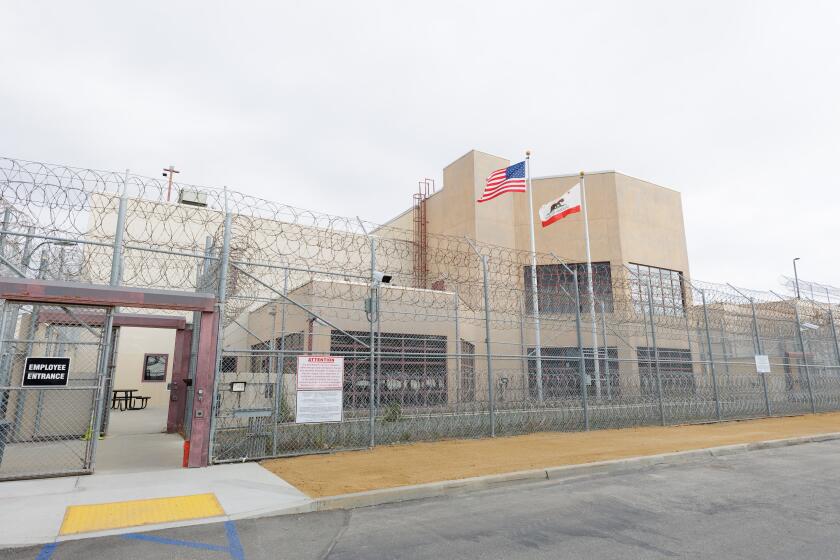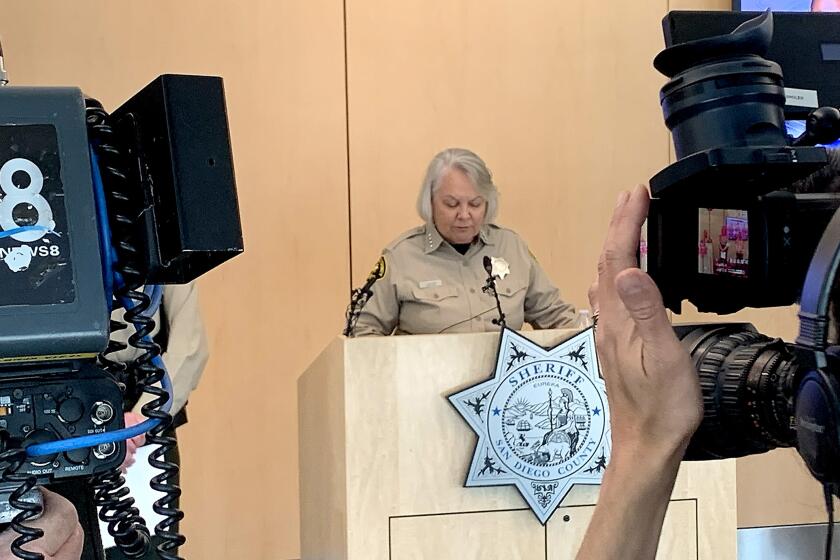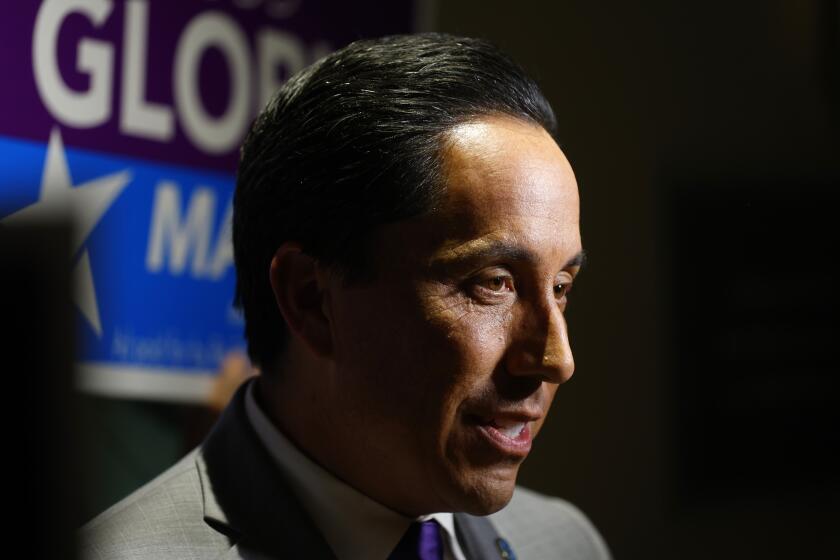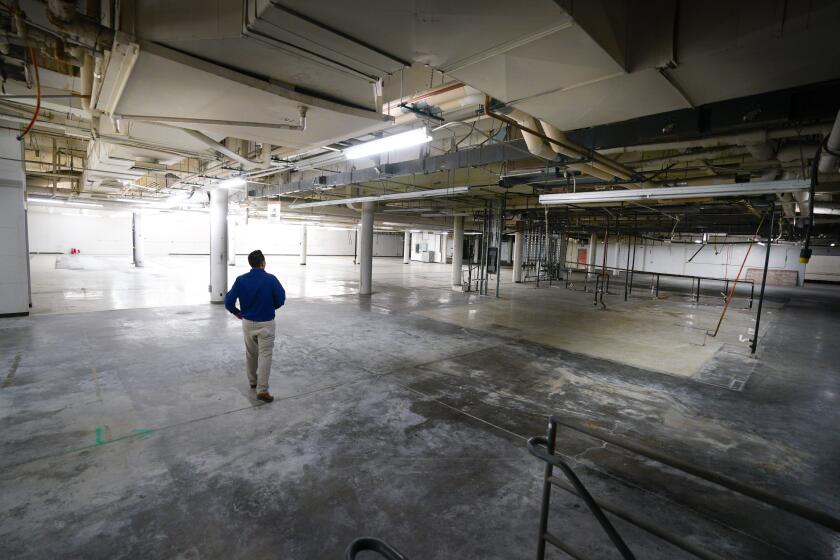Law enforcement board may begin inspecting San Diego County jails
The Citizens Law Enforcement Review Board, charged with investigating complaints against the San Diego County Sheriff’s Department, is moving for the first time in its history toward annual inspections of jail facilities.
The group earlier this month voted to form a committee to draw up a framework for jail inspections, in response to an advocacy group’s report about a rash of suicides and other deaths at the facilities.
It would be the first time in the board’s 25 years that it has conducted such inspections, despite having the authority to do so.
“There is a need for CLERB to take care of this,” board member Kim-Thoa Hoang said.
The move comes in response to the Sacramento-based watchdog group Disability Rights California, which found that the review board has failed to fulfill its mission and urged county officials to improve jail oversight.
Paul Parker, CLERB’s executive officer who was hired a year ago, said lack of staff seems to be the reason the board has never inspected the jails.
Parker said he requested and was granted funding to hire an additional investigator, bringing CLERB’s full-time investigative staff up to three when it’s historically been two.
Aaron Fischer, an attorney with Disability Rights California and co-author of the report, said that’s not enough. He pointed to CLERB’s decision in November to dismiss 22 death investigations without reviewing the cases, amid a backlog.
“More staff is always good, of course,” Fischer said, “but I don’t think that’s going to cut the ice just in terms of the workload that they have.”
Fischer also questioned the review board’s independence. Currently, it’s part of the county’s Public Safety Group, which includes the Sheriff’s Department.
“An oversight entity should be wholly independent of the agency it’s charged to monitor,” he said. “Without that independence, there’s too great a risk of undue influence.”
During the first four months of this year, the review board received 66 complaints compared to 31 during the same period last year and 49 in 2016. It’s also handling 36 open death investigations. Twenty-one of those cases involve people who died in custody.
The Disability Rights California report is the culmination of a two-year investigation into the high number of suicides in San Diego jails. Seventeen people committed suicide between 2014 and 2016. Los Angeles County jails, which hold three times the number of inmates as San Diego, had eight suicides during the same period, the report notes.
The report’s findings highlight a number of issues, including an over-reliance on solitary confinement, a shortage of psychiatric staff and deputies overriding decisions by mental health professionals.
In a lengthy response to the report, the Sheriff’s Department described steps it has taken to expand services to mentally ill inmates and better monitor inmates at risk of self-harm. The department is also working on creating a team to evaluate current suicide-prevention policies, the response says.
“It has long been and continues to be the goal of the County of San Diego and the Sheriff’s Department to provide to those suffering from mental illness the best possible housing, treatment and care,” the response says.
In 2017, the department went almost an entire year without a suicide.
Then on Dec. 16, 2017, 45-year-old Chadwick Moore hanged himself in the George Bailey Detention Facility in Otay Mesa after being sentenced to 12 years in prison. According to the medical examiner’s report, Moore told his girlfriend he’d kill himself if he received a lengthy sentence.
Michael Sullivan, 62, hanged himself in the South Bay Detention Facility on March 28, and on May 18, an inmate at the Central Jail was found hanging in his cell and is currently hospitalized.
Fischer said jail oversight needs to be able to respond to issues in the jails as they arise.
His group and others like it across the nation were given authority to conduct inspections by Congress in 2000. Even Fischer’s team, which gives jails advance notice of inspections as a courtesy, doesn’t get a full picture of jail conditions, he said.
“We often hear from inmates that their unit got special cleaning the day before we arrived, or that new books had just been brought in for inmates,” he said. “In some cases, we’ve smelled fresh paint on the walls.
“It’s a good thing that facilities want to impress visitors,” he added, “but it also makes it difficult to get a full and accurate picture of what things are like on a typical day.”
The Disability Rights report expresses concern with the Sheriff’s Department’s internal review of inmate suicides, finding that it fails to identify how changes in policy or training will be enforced.
Dave Myers, a sheriff’s commander who’s running to replace Sheriff Bill Gore, has publicly raised concerns about how the department reviews inmate deaths. Myers said he sat on the board that handled such review, but has been shut out since he announced his candidacy.
The focus of those reviews, Myers said, was on minimizing legal exposure and not on improving training or policy.
“The goal is to absolutely eliminate any liability at the expense of meaningful training discussions with the supervisors who were there on scene,” he said.
Myers said the goal of any review should be to ensure that if mistakes were made, they don’t happen again.
In its response to Disability Rights California, the department said that “all suicide attempts are reviewed to address areas of improvement.”
Previously
- County settles jail meth death for $2.3 million
- Report calls for jail basics like hand sanitizer, recreation space
- Jail death from excess water drinking raises questions
- Suicides still plague county jails
- Inmate: Marine’s noose was ignored
- Marine’s widow sues over jail death
Get Essential San Diego, weekday mornings
Get top headlines from the Union-Tribune in your inbox weekday mornings, including top news, local, sports, business, entertainment and opinion.
You may occasionally receive promotional content from the San Diego Union-Tribune.











